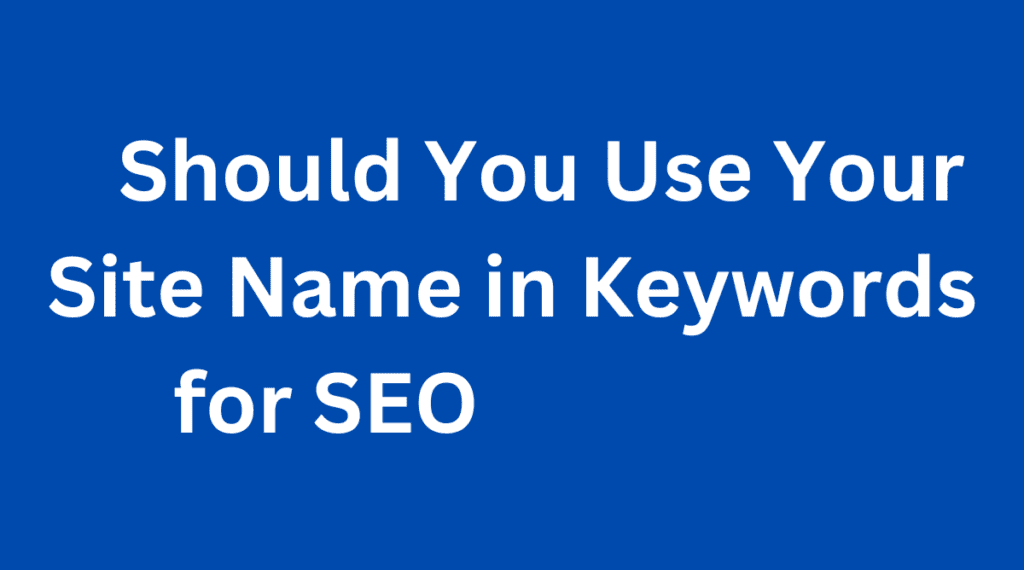Introduction
When it comes to search engine optimization (SEO), selecting the right keywords is crucial for driving traffic and improving visibility. One common question among business owners and SEO beginners is whether to include their site name in their targeted keywords. While branding is important, understanding when and how to use your site name in SEO can impact your rankings and overall search strategy.
In this article, we’ll explore the benefits and drawbacks of using your site name in keywords and provide practical guidelines for making an informed decision.
What Are Keywords in SEO?
Keywords are specific words or phrases that users type into search engines to find information, products, or services. For example, if you own a fitness blog, keywords like “best home workouts” or “nutrition tips for weight loss” help attract visitors searching for those topics.
Site names, on the other hand, are unique to your brand. For instance, if your site is called “FitLife Hub,” you might wonder whether using “FitLife Hub nutrition tips” as a keyword is beneficial.
Pros of Using Your Site Name in Keywords
1. Brand Recognition and Authority
Using your site name in keywords can strengthen brand recognition. When users consistently see your brand in search results, it builds trust and credibility, making them more likely to click on your website.
2. Improved Click-Through Rates (CTR)
If your site is well-known or has an established reputation, including your brand name in keywords can improve click-through rates. Users familiar with your business are more likely to choose your link over competitors.
3. Helps in Branded Search Optimization
Branded searches (queries that include your business name) often have high conversion rates. Optimizing for branded keywords ensures that your official site ranks at the top when users specifically look for your business.
4. Competitive Edge
If competitors bid on your brand name in paid search campaigns, having your site name optimized in organic search can help you maintain visibility and prevent competitors from overshadowing your results.
Cons of Using Your Site Name in Keywords
1. Wasted Keyword Opportunity
Google already prioritizes your site when users search for your brand name. Instead of using valuable keyword space for your site name, you could focus on high-traffic, non-branded keywords that attract a broader audience.
2. Limited Reach
Generic and long-tail keywords (like “best SEO strategies for small businesses”) often attract more organic traffic than branded keywords. If your brand isn’t widely recognized, users are unlikely to search for your name, limiting your reach.
3. Keyword Cannibalization
Overusing your site name in keywords can lead to keyword cannibalization, where multiple pages on your site compete for the same search terms. This can dilute your SEO efforts and confuse search engines.
4. Not Ideal for New Businesses
If your website is new and lacks authority, prioritizing your brand name in keywords won’t yield immediate results. It’s better to focus on niche keywords relevant to your industry before incorporating branded terms.
When Should You Use Your Site Name in Keywords?
While there are downsides, using your site name in keywords can be beneficial in certain situations. Here are some instances where it makes sense:
- Branded Content and Landing Pages: If you’re optimizing an “About Us” page or a branded campaign, including your site name can help establish authority.
- Social Media and PR Strategies: When linking social media posts, press releases, or guest posts to your website, using your site name in anchor text reinforces brand consistency.
- Navigational Keywords: Users searching specifically for your site should easily find it through branded keywords.
- Competitor Protection: To safeguard your brand from competitors trying to rank for your name, optimizing branded keywords can help maintain visibility.
How to Effectively Use Your Site Name in SEO Strategy
If you decide to use your site name in keywords, follow these best practices to maximize benefits without sacrificing other SEO opportunities:
- Use Your Site Name in Title Tags and Meta Descriptions
- Example: “Best SEO Strategies for Small Businesses | YourSiteName”
- Include Branded Keywords in Internal Linking
- Link related pages using anchor text with your site name strategically.
- Optimize Your Google My Business (GMB) Profile
- Ensure your site name is correctly listed in GMB to improve local search visibility.
- Leverage Branded Hashtags and Mentions in Social Media
- Encourage users to search for and engage with your brand online.
- Monitor Branded Search Performance in Google Search Console
- Track how your branded keywords perform and adjust your strategy accordingly.
Conclusion
So, should you use your site name in keywords for SEO? The answer depends on your business goals and branding strategy. While it can boost brand recognition and click-through rates, it’s not always the best approach for reaching a wider audience. For SEO beginners and business owners, balancing branded and non-branded keywords is the key to a successful SEO strategy.
By focusing on relevant industry keywords while strategically incorporating your brand name where necessary, you can enhance your site’s visibility and authority without compromising organic traffic potential.
Need Help with Your SEO Strategy?
If you’re looking for professional SEO guidance to optimize your website, feel free to reach out. Whether you’re a business owner or just starting in SEO, implementing the right keyword strategy can make all the difference!
